MercoPress. South Atlantic News Agency
Tag: Argentina soybean
-
Tuesday, April 4th 2023 - 21:30 UTC
Brazil ready to supply Argentina with soybeans for the its crushing industry
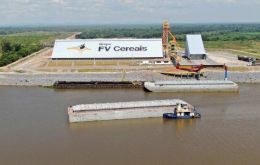
Brazil has enough potential to supply up to half of the soybeans that Argentina will import to keep its industrial park running in the face of the historic drought that ravaged the 2022/23 crop in the country, which is usually the largest exporter of soy oil and soy meal in the world.
-
Saturday, December 17th 2022 - 09:51 UTC
“Soybean dollar 2” working as planned for Argentine authorities
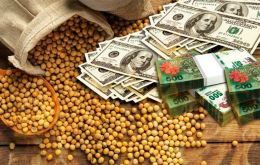
Argentina's new version of the “Export Increase Program” (PIE) has resulted in US$ 1.824 billion worth of soybeans sold abroad, which nearly meets the government's target, it was reported Friday in Buenos Aires.
-
Friday, September 16th 2022 - 08:07 UTC
The September “soy dollar” convinces Argentine farmers to sell their crops
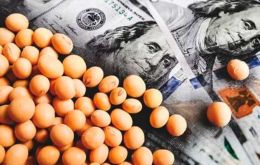
Argentine farmers have sold 15.2% of the country’s 44 million-ton 2021/22 soy crop in seven days since the government implemented a more favorable exchange rate for cash crop exports, Rosario grains exchange reported.
-
Wednesday, March 9th 2022 - 09:56 UTC
Severe drought impacts on Argentine corn and soybean crop estimates
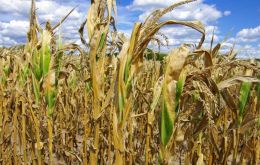
Argentina’s corn 2021/22 crop has now been estimated at less than the 48 million tons of just a few weeks ago, according to the Rosario grains exchange, because a severe drought has slashed yields. Likewise with soybeans first estimate of 40,5 million tons.
-
Saturday, August 21st 2021 - 08:00 UTC
Corn replacing soybeans as the main crop for Argentine farmers
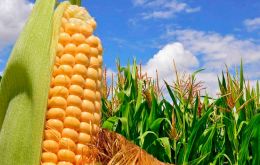
Argentine farmers are expected to sow more corn than ever this season, while soybeans will fall to an all time 15-year minimum because of the export policy of the current administration and the lack of the regulatory framework for genetically modified, GM, seeds.
-
Tuesday, June 9th 2020 - 07:40 UTC
Argentina's Vicentin soy giant claims government never informed it of taking over the group
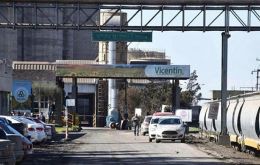
Late Monday the Vicentin soy crushing giant group, which Argentine president Alberto Fernandez had previously announced it would take over to ensure jobs and food sovereignty, made public a release denying any job losses and revealing it was in talks with interested parties to overcome the current under administration situation.
-
Tuesday, June 9th 2020 - 07:25 UTC
Argentina will take over soy-crushing giant, currently under administration

Argentine President Alberto Fernandez announced Monday evening a plan to seize crop trader Vicentin SAIC in a move that is anticipated will ring alarm bells in soy markets, among investors in the country and even the current foreign debt negotiations.
-
Friday, March 13th 2020 - 08:10 UTC
Argentina soybean output forecast to reach 52 million tons, down 6% year on year
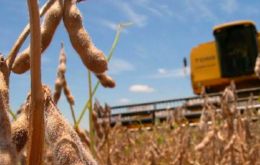
Soybean output for Argentina -- the world's third-largest soy producer and exporter -- is forecast to be at 52 million tons, down 4.6% on February estimates and 6% year on year, in 2019-20 crop year (November-October), on dry conditions in Córdoba and Santa Fe, a Buenos Aires Grains Exchange report said on Thursday.
-
Tuesday, December 17th 2019 - 23:54 UTC
Argentine farmers reject increase in export taxes, but privilege dialogue

Argentine farmers are disappointed with the new taxes on farm produce exports decreed by government, and particularly with president Alberto Fernandez who had promised during the campaign to work with them in developing policies.
-
Sunday, December 15th 2019 - 10:58 UTC
Rise on Argentine agrifood export taxes decreed, effective immediately

Argentine President Alberto Fernández signed a decree whereby export taxes on soy, wheat, corn and beef go up. The decree became available Saturday as it appeared in the Official Gazette and is effective immediately.
